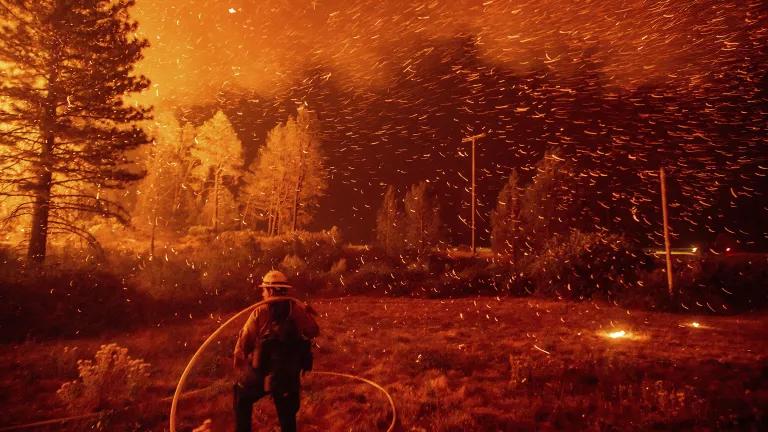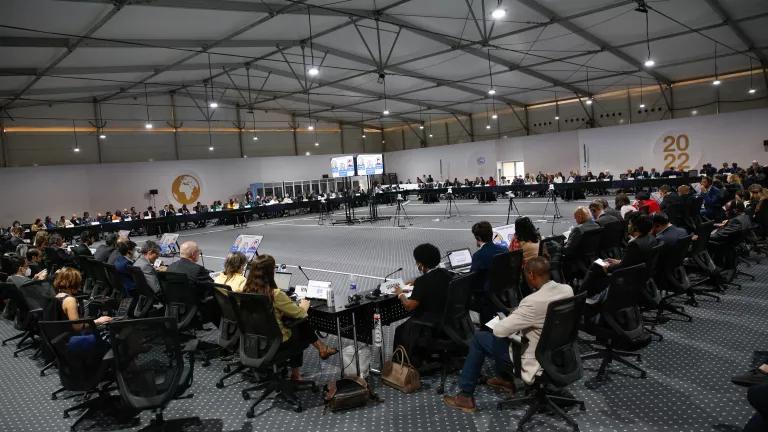Climate Change Drives the Politics of Climate Change

Opening Remarks at the Milken Institute 2019 Global Conference Panel: “If We Do Nothing: Earth’s Climate at the Tipping Point.”
We are at a crossroads in our fight against climate change. Without further action we are certainly headed well north of 3˚C of additional warming by the end of century. But concern about climate change is at an all-time high, pushing the issue to the top of the agenda for national discussion, as more and more Americans now understand that climate change is neither far in the future nor far away. In short, as my colleague David Doniger points out, climate change itself is changing the politics of climate change.
To understand the current state of climate politics, it’s important to start by asking, “what is science telling us?” As many of you are probably aware, two authoritative reports on climate change came out last fall: The International Panel on Climate Change (IPCC) special report on 1.5˚C and the National Climate Assessment. We should take away three key points from these reports:
- We are feeling the effects now and the future impacts will be worse than we thought. Unabated global warming will leave vast swaths of the planet uninhabitable, and lead to species extinction, loss of sensitive ecosystems, and tremendous economic losses.
- We don’t have 10 years to act, we must act now. To hold temperature change to 1.5˚C, we need to start cutting global pollution in half every decade and reach net zero by mid-century.
- There is no threshold; every ton matters. Even if we don’t achieve the emission cuts for 1.5˚, 1.5˚ is better than 2˚, 2˚ is better than 2.5˚. The most important thing is to get started and get started now.
Fortunately, we are seeing a political window of opportunity open up and build momentum towards 2020 and 2021.
Climate Change Is Real
It is here and now and, for many of us, it's happening in our own backyards as extreme weather events increase in intensity and frequency. The last two years alone have seen:
- Five of the 10 most destructive wildfires in California history
- An epic once in 500,000-year storm, Hurricane Harvey struck Texas in 2017
- All told, wildfires, hurricanes, tornadoes, flooding, drought, and other severe, climate change-related weather events caused more than $300 billion in damages in 2017, and shattered the previous U.S. record set in 2005

As a result, 73 percent of Americans now believe that climate change is happening, according to a highly respected Yale climate communications poll. A record number of people are also “very worried” about global warming, with a stunning 8-point rise in less than a year.
Recent polling shows this rising concern cuts across generational, geographic, and partisan lines—and political leaders in the states and Washington, D.C. are finally responding. In a matter of months, climate activists campaigning for a “Green New Deal” have upended the conversation about climate change among both parties in Washington.
A Crossroads for Our Future
This concern has placed climate squarely on the top of the agenda in Washington. In 2016, climate change ranked in the top 15 issues among voters and polls back up the importance of the issue for 2020. In a recent poll of likely Democratic primary voters, addressing the climate crisis is a top tier issue, shared only with universal healthcare coverage.
It is also moving the conversation back to the center. Increasingly, Republicans in the House and Senate are issuing statements that they believe climate is real and humans are a primary cause. The debate is shifting from “is it real?” to “what are the solutions?” which, especially for Washington, is huge progress. Among climate champions, the focus is now on what solutions are big enough to be effective and also politically popular enough to pass.
We are living at critical moment in time. While climate change is changing the politics of climate change, the key question is whether it is changing fast enough? The answer to that question will profoundly affect all our lives and the lives of our children.
Watch the full discussion:



